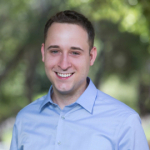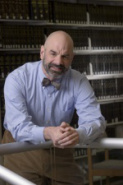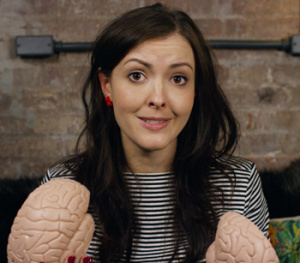David McRaney's Blog, page 26
August 24, 2016
083 – Idiot Brain – Dean Burnett
In this episode we interview Dean Burnett, author of Idiot Brain: What Your Brain is Really Up To. Burnett’s book is a guide to the neuroscience behind the things that our amazing brains do poorly.
 In the interview we discuss motion sickness, the pain of breakups, why criticisms are more powerful than compliments, the imposter syndrome, anti-intellectualism, irrational fears, and more. Burnett also explains how the brain is kinda sorta like a computer, but a really bad one that messes with your files, rewrites your documents, and edits your photos when you aren’t around.
In the interview we discuss motion sickness, the pain of breakups, why criticisms are more powerful than compliments, the imposter syndrome, anti-intellectualism, irrational fears, and more. Burnett also explains how the brain is kinda sorta like a computer, but a really bad one that messes with your files, rewrites your documents, and edits your photos when you aren’t around.
Dean Burnett is a neuroscientist who lectures at Cardiff University and writes about brain stuff over at his blog, Brain Flapping hosted by The Guardian.

Download – iTunes – Stitcher – RSS – Soundcloud
 This episode is sponsored by The Great Courses Plus. Get unlimited access to a huge library of The Great Courses lecture series on many fascinating subjects. Start FOR FREE with The Inexplicable Universe: Unsolved Mysteries taught by
This episode is sponsored by The Great Courses Plus. Get unlimited access to a huge library of The Great Courses lecture series on many fascinating subjects. Start FOR FREE with The Inexplicable Universe: Unsolved Mysteries taught by
Neil deGrasse Tyson. Everything we now know about the universe—from the behavior of quarks to the birth of entire galaxies—has stemmed from scientists who’ve been willing to ponder the unanswerable. Click here for a FREE TRIAL.
 For less than $10 per meal, Blue Apron delivers seasonal recipes along with pre-portioned ingredients to make delicious, home-cooked meals. Blue Apron knows that when you cook with incredible ingredients, you make incredible meals, so they set the highest quality standards for their community of artisanal suppliers, family-run farms, fisheries and ranchers. Check out this week’s menu and get your first THREE meals FREE—WITH FREE SHIPPING—by going to blueapron.com/yanss
For less than $10 per meal, Blue Apron delivers seasonal recipes along with pre-portioned ingredients to make delicious, home-cooked meals. Blue Apron knows that when you cook with incredible ingredients, you make incredible meals, so they set the highest quality standards for their community of artisanal suppliers, family-run farms, fisheries and ranchers. Check out this week’s menu and get your first THREE meals FREE—WITH FREE SHIPPING—by going to blueapron.com/yanss
 Support the show directly by becoming a patron! Get episodes one-day-early and ad-free. Head over to the YANSS Patreon Page for more details.
Support the show directly by becoming a patron! Get episodes one-day-early and ad-free. Head over to the YANSS Patreon Page for more details.

Links and Sources
Download – iTunes – Stitcher – RSS – Soundcloud
Illustration: Wikimedia Commons

YANSS 082 – Crowds (rebroadcast)
This episode’s guest, Michael Bond, is the author of The Power of Others, and reading his book I was surprised to learn that despite several decades of research into crowd psychology, the answers to most questions concerning crowds can still be traced back to a book printed in 1895.
Gustave’s Le Bon’s book, The Crowd: A Study of the Popular Mind, explained that humans in large groups are dangerous, that people spontaneously de-evolve into subhuman beasts who are easily swayed and prone to violence. That viewpoint has informed the policies and tactics of governments and police forces for more than a century, and like many prescientific musings, much of it is wrong.
 Listen in this episode as Michael Bond, explains that the more research the social sciences conduct, the less the idea of a mindless, animalistic mob seems to be true. He also explains what police forces and governments should be doing instead of launching tear gas canisters from behind riot shields which actually creates the situation they are trying to prevent. Also, we touch on the psychology of suicide bombers, which is just as surprising as what he learned researching crowds.
Listen in this episode as Michael Bond, explains that the more research the social sciences conduct, the less the idea of a mindless, animalistic mob seems to be true. He also explains what police forces and governments should be doing instead of launching tear gas canisters from behind riot shields which actually creates the situation they are trying to prevent. Also, we touch on the psychology of suicide bombers, which is just as surprising as what he learned researching crowds.

Download – iTunes – Stitcher – RSS – Soundcloud
 This episode is sponsored by The Great Courses Plus. Get unlimited access to a huge library of The Great Courses lecture series on many fascinating subjects. Start FOR FREE with The Inexplicable Universe: Unsolved Mysteries taught by
This episode is sponsored by The Great Courses Plus. Get unlimited access to a huge library of The Great Courses lecture series on many fascinating subjects. Start FOR FREE with The Inexplicable Universe: Unsolved Mysteries taught by
Neil deGrasse Tyson. Everything we now know about the universe—from the behavior of quarks to the birth of entire galaxies—has stemmed from scientists who’ve been willing to ponder the unanswerable. Click here for a FREE TRIAL.
 There is no better way to create a website than with Squarespace. Creating your website with Squarespace is a simple, intuitive process. You can add and arrange your content and features with the click of a mouse. Squarespace makes adding a domain to your site simple; if you sign up for a year you’ll receive a custom domain for free for a year. Start your free trial today, at Squarespace.com and enter offer code SOSMART to get 10% off your first
There is no better way to create a website than with Squarespace. Creating your website with Squarespace is a simple, intuitive process. You can add and arrange your content and features with the click of a mouse. Squarespace makes adding a domain to your site simple; if you sign up for a year you’ll receive a custom domain for free for a year. Start your free trial today, at Squarespace.com and enter offer code SOSMART to get 10% off your first
purchase.
 Support the show directly by becoming a patron! Get episodes one-day-early and ad-free. Head over to the YANSS Patreon Page for more details.
Support the show directly by becoming a patron! Get episodes one-day-early and ad-free. Head over to the YANSS Patreon Page for more details.

Links and Sources
Download – iTunes – Stitcher – RSS – Soundcloud
The Power of Others: Peer Pressure, Groupthink, and How the People Around Us Shape Everything We Do

Gender Quotas and Tight Cultures Study
Army Manual for Dealing With Civil Unrest

YANSS 081 – The Climate Paradox
In this episode, psychologist Per Espen Stoknes discusses his book: What We Think About When We Try Not to Think About Global Warming.
 Stoknes has developed a strategy for science communicators who find themselves confronted with climate change deniers who aren’t swayed by facts and charts. His book presents a series of psychology-based steps designed to painlessly change people’s minds and avoid the common mistakes scientists tend to make when explaining climate change to laypeople.
Stoknes has developed a strategy for science communicators who find themselves confronted with climate change deniers who aren’t swayed by facts and charts. His book presents a series of psychology-based steps designed to painlessly change people’s minds and avoid the common mistakes scientists tend to make when explaining climate change to laypeople.

Download – iTunes – Stitcher – RSS – Soundcloud
 This episode is sponsored by The Great Courses Plus. Get unlimited access to a huge library of The Great Courses lecture series on many fascinating subjects. Start FOR FREE with The Inexplicable Universe: Unsolved Mysteries taught by
This episode is sponsored by The Great Courses Plus. Get unlimited access to a huge library of The Great Courses lecture series on many fascinating subjects. Start FOR FREE with The Inexplicable Universe: Unsolved Mysteries taught by
Neil deGrasse Tyson. Everything we now know about the universe—from the behavior of quarks to the birth of entire galaxies—has stemmed from scientists who’ve been willing to ponder the unanswerable. Click here for a FREE TRIAL.
 There is no better way to create a website than with Squarespace. Creating your website with Squarespace is a simple, intuitive process. You can add and arrange your content and features with the click of a mouse. Squarespace makes adding a domain to your site simple; if you sign up for a year you’ll receive a custom domain for free for a year. Start your free trial today, at Squarespace.com and enter offer code SOSMART to get 10% off your first
There is no better way to create a website than with Squarespace. Creating your website with Squarespace is a simple, intuitive process. You can add and arrange your content and features with the click of a mouse. Squarespace makes adding a domain to your site simple; if you sign up for a year you’ll receive a custom domain for free for a year. Start your free trial today, at Squarespace.com and enter offer code SOSMART to get 10% off your first
purchase.
 This episode is also brought to you by Mack Weldon who believes in smart design, premium fabrics and simple shopping. All of their products (shirts, socks, sweats, underwear) are naturally antimicrobial (which means they eliminate odor). They want you to be comfortable, so If you don’t like your first garment, you can keep it, and they will still refund you. No questions asked. Go toMackWeldon.Com and get 20% off using promo code SOSMART.
This episode is also brought to you by Mack Weldon who believes in smart design, premium fabrics and simple shopping. All of their products (shirts, socks, sweats, underwear) are naturally antimicrobial (which means they eliminate odor). They want you to be comfortable, so If you don’t like your first garment, you can keep it, and they will still refund you. No questions asked. Go toMackWeldon.Com and get 20% off using promo code SOSMART.
 Support the show directly by becoming a patron! Get episodes one-day-early and ad-free. Head over to the YANSS Patreon Page for more details.
Support the show directly by becoming a patron! Get episodes one-day-early and ad-free. Head over to the YANSS Patreon Page for more details.

Links and Sources
Download – iTunes – Stitcher – RSS – Soundcloud
What We Think About When We Try Not to Think About Global Warming
Image Source: Wikimedia Commons

July 18, 2016
YANSS 080 – Deep Canvassing
Oddly enough, we don’t know very much about how to change people’s minds on social issues, not scientifically. That’s why the work of the a group of LGBT activists in Los Angeles is offering something valuable to psychology and political science – a detailed map of uncharted scientific territory.
Over the last eight years, and through more than 12,000 conversations, The Leadership LAB has developed a new kind of persuasion they call deep canvassing. Volunteer’s go door-to-door, talking to strangers, and often change their attitudes about things like same-sex marriage and transgender rights.
Unfortunately, the first scientist to measure the technique’s effectiveness also committed scientific fraud by copy/pasting some data from another study and cutting corners in other ways, creating a wave of negative publicity that threatened the reputation of the people who created the technique, even though they were just the subjects of the study and not involved in the wrongdoing.
In the show, you will meet two scientists who uncovered the fraud and got the paper retracted, and then decided to go ahead and start over, do new research themselves, and see if the persuasion technique that the original researcher was supposed to be studying truly worked.
Can you reduce prejudice with a single 20-minute conversation? Can you flip people’s opinions in just one encounter? Learn what the latest science has to say about deep canvassing in this episode of the You Are Not So Smart Podcast.

Download – iTunes – Stitcher – RSS – Soundcloud
 This episode is sponsored by The Great Courses Plus. Get unlimited access to a huge library of The Great Courses lecture series on many fascinating subjects. Start FOR FREE with The Inexplicable Universe: Unsolved Mysteries taught by
This episode is sponsored by The Great Courses Plus. Get unlimited access to a huge library of The Great Courses lecture series on many fascinating subjects. Start FOR FREE with The Inexplicable Universe: Unsolved Mysteries taught by
Neil deGrasse Tyson. Everything we now know about the universe—from the behavior of quarks to the birth of entire galaxies—has stemmed from scientists who’ve been willing to ponder the unanswerable. Click here for a FREE TRIAL.
This episode is also sponsored  by Casper Mattresses. Buying a Casper mattress is completely risk free. Casper offers free delivery and free returns with a 100-night home trial. If you don’t love it, they’ll pick it up and refund you everything. Casper understands the importance of truly sleeping on a mattress before you commit, especially considering you’re going to spend a third of your life on it. Get $50 toward any mattress purchase by visiting www.casper.com/sosmart and using offer code “sosmart.” Terms and Conditions Apply.
by Casper Mattresses. Buying a Casper mattress is completely risk free. Casper offers free delivery and free returns with a 100-night home trial. If you don’t love it, they’ll pick it up and refund you everything. Casper understands the importance of truly sleeping on a mattress before you commit, especially considering you’re going to spend a third of your life on it. Get $50 toward any mattress purchase by visiting www.casper.com/sosmart and using offer code “sosmart.” Terms and Conditions Apply.
 This episode is also brought to you by Mack Weldon who believes in smart design, premium fabrics and simple shopping. All of their products (shirts, socks, sweats, underwear) are naturally antimicrobial (which means they eliminate odor). They want you to be comfortable, so If you don’t like your first garment, you can keep it, and they will still refund you. No questions asked. Go to MackWeldon.Com and get 20% off using promo code SOSMART.
This episode is also brought to you by Mack Weldon who believes in smart design, premium fabrics and simple shopping. All of their products (shirts, socks, sweats, underwear) are naturally antimicrobial (which means they eliminate odor). They want you to be comfortable, so If you don’t like your first garment, you can keep it, and they will still refund you. No questions asked. Go to MackWeldon.Com and get 20% off using promo code SOSMART.
 Support the show directly by becoming a patron! Get episodes one-day-early and ad-free. Head over to the YANSS Patreon Page for more details.
Support the show directly by becoming a patron! Get episodes one-day-early and ad-free. Head over to the YANSS Patreon Page for more details.

 Dave Fleischer has been a professional mind changer for more than 30 years, and has directed the Leadership LAB since 2010. Previously, he created the Gay & Lesbian Victory Fund and worked as an organizer for the National LGBTQ Task Force.
Dave Fleischer has been a professional mind changer for more than 30 years, and has directed the Leadership LAB since 2010. Previously, he created the Gay & Lesbian Victory Fund and worked as an organizer for the National LGBTQ Task Force.
 Joshua Kalla is a PhD student at the University of California Berkley. He studies political science and how voters make and change their minds.
Joshua Kalla is a PhD student at the University of California Berkley. He studies political science and how voters make and change their minds. David Brookman is an Assistant Professor at Stanford’s Graduate School of Business and studies political science as well as persuasion and perspective taking.
David Brookman is an Assistant Professor at Stanford’s Graduate School of Business and studies political science as well as persuasion and perspective taking.
 Laura Gardiner (at the time of this recording) was the national mentoring coordinator for the Leadership LAB and helped manage their experimental persuasion canvassing project. Laura spent eight years with the team before moving on to other pursuits.
Laura Gardiner (at the time of this recording) was the national mentoring coordinator for the Leadership LAB and helped manage their experimental persuasion canvassing project. Laura spent eight years with the team before moving on to other pursuits.
 Steve Deline is a field organizer at the Leadership LAB. He started as a volunteer in 2009 and helped create the LAB’s video documentation project, which, according to their website, “has since captured more than 2,000 conversations between canvassers and voters on film and become integral to the team’s ability to develop new approaches to persuasion.”
Steve Deline is a field organizer at the Leadership LAB. He started as a volunteer in 2009 and helped create the LAB’s video documentation project, which, according to their website, “has since captured more than 2,000 conversations between canvassers and voters on film and become integral to the team’s ability to develop new approaches to persuasion.”
In every episode, after I read a bit of self delusion news, I taste a cookie baked from a recipe sent in by a listener/reader. That listener/reader wins a signed copy of my new book, “You Are Now Less Dumb,” and I post the recipe on the YANSS Pinterest page. This episode’s winner is Deanna Klingbeal who sent in a recipe for chocolate waffle cookies. Send your own recipes to david {at} youarenotsosmart.com.
Links and Sources
Download – iTunes – Stitcher – RSS – Soundcloud
Durably reducing transphobia: A field experiment on door-to-door canvassing
Video: Watch a Voter Change Her Mind
Image courtesy of The Leadership LAB, screenshot of video linked above.
Music:
• Espanto
• Dr. Tikov
• Twin Musicom
• Fin Taylor
• Banjopocalypse
• Caravan Palace
• Mogwai

June 29, 2016
YANSS 079 – Separate Spheres
Common sense used to dictate that men and women should only come together for breakfast and dinner.
According to Victorian historian Kaythrn Hughes, people in the early 19th Century thought the outside world was dangerous and unclean and morally dubious and thus no place for a virtuous, fragile woman. The home was a paradise, a place for civility, where perfect angelic ladies could, in her words, “counterbalance the moral taint of the public sphere.” If you’ve read Pride and Prejudice, you get the idea. Women learned to play music and read poetry, while men went out into the world and got their hands dirty.
By the mid 1800s, women were leaving home to work in factories, and they were fighting for their right to vote and to get formal educations and much more – and if you believed in preserving the separate spheres, the concept that men and women should only cross paths at breakfast and dinner, then as we approached the 20th century, this created a lot of anxiety for you.
Despite their relative invisibility, a norm, even a dying one, can sometimes be harnessed and wielded like a weapon by conjuring up old fears from a bygone era. It’s a great way to slow down social change if you fear that change. When a social change threatens your ideology, fear is the simplest, easiest way to keep more minds from changing.
In this episode of the You Are Not So Smart Podcast, we explore how the separate spheres ideology is still affecting us today, and how some people are using it to scare people into voting down anti-discrimination legislation.

Download – iTunes – Stitcher – RSS – Soundcloud
This episode is sponsored by Blue Apron who sets the highest quality standards for their community of artisanal suppliers, family-run farms, fisheries and ranchers. For less than $10 per meal, Blue Apron delivers the best ingredients along with easy-to-read, full-color recipes with photos and additional information about where your food came from. Check out this week’s menu and get your first three meals free with free shipping by going to www.blueapron.com/YANSS
This episode is also sponsored by The Great Courses Plus. Get unlimited access to a huge library of The Great Courses lecture series on many fascinating subjects. Start FOR FREE with The Fundamentals of Photography filmed in partnership with The National Geographic and taught by professional photographer Joel Sartore. Click here for a FREE TRIAL.
Support the show directly by becoming a patron! Get episodes one-day-early and ad-free. Head over to the YANSS Patreon Page for more details.


Terry Kogan clerked for the U.S. Fourth Circuit Court of Appeals and practiced law in Boston before joining the University of Utah where he teaches law concerning contracts, copyright, trusts, art, and sexuality. According to his official bio, “He has spent the past decade considering the rights of transgender people, in particular issues surrounding the legal and cultural norms that mandate the segregation of public restrooms by sex.”
In every episode, after I read a bit of self delusion news, I taste a cookie baked from a recipe sent in by a listener/reader. That listener/reader wins a signed copy of my new book, “You Are Now Less Dumb,” and I post the recipe on the YANSS Pinterest page. This episode’s winner is Mark P who sent in a recipe for oatmeal engineers. Send your own recipes to david {at} youarenotsosmart.com.
Links and Sources
Download – iTunes – Stitcher – RSS – Soundcloud
Sex-Separation in Public Restrooms: Law, Architecture, and Gender
Gender roles in the 19th Century
This Anti-HERO Ad Is the Definition of Transphobia
South Park Takes on Trans Issues … and It’s Great
Feds issue guidance on transgender access to school bathrooms
Houston Voters Reject Broad Anti-Discrimination Ordinance
Who’s behind the new LGBT bathroom laws?
Image Source – in the Public Domain
Music:
• Espanto
• Dr. Tikov
• James Malloy
• Twin Musicom
• Scott Joplin
• Fin Taylor
• Banjopocalypse
• Caravan Palace

June 16, 2016
YANSS 078 – The Existential Fallacy
Hypothetical situations involving dragons, robots, spaceships, and vampires have all been used to prove and disprove arguments.
Statements about things that do not exist can still be true, and can be useful thinking tools for exploring philosophical, logical, sociological, and scientific concepts.
The problem is that sometimes those same arguments accidentally require those fictional concepts to be real in order to support their conclusions, and that’s when you commit the existential fallacy.
In this episode we explore the most logical logical fallacy of them all, the existential fallacy. No need to get out your pens and paper, we will do that for you, as we make sense of one the most break-breaking thinking mistakes we’ve ever discovered.
This episode of the You Are Not So Smart Podcast is the tenth in a full season of episodes exploring logical fallacies. The first episode is here.

Download – iTunes – Stitcher – RSS – Soundcloud
This episode is sponsored by Bombas – game-changing socks. Bombas decided to take socks seriously, by designing the most highly engineered, best-fitting, comfortable socks humans have ever imagined – and they look cool too. Go to Bombas.com/SOSMART for 20% off your first order.
This episode is also sponsored by Casper Mattresses. Buying a Casper mattress is completely risk free. Casper offers free delivery and free returns with a 100-night home trial. If you don’t love it, they’ll pick it up and refund you everything. Casper understands the importance of truly sleeping on a mattress before you commit, especially considering you’re going to spend a third of your life on it. Get $50 toward any mattress purchase by visiting www.casper.com/sosmart and using offer code “sosmart.” Terms and Conditions Apply.
This episode is also sponsored by The Great Courses Plus. Get unlimited access to a huge library of The Great Courses lecture series on many fascinating subjects. Start FOR FREE with The Fundamentals of Photography filmed in partnership with The National Geographic and taught by professional photographer Joel Sartore. Click here for a FREE TRIAL.
Support the show directly by becoming a patron! Get episodes one-day-early and ad-free. Head over to the YANSS Patreon Page for more details.

 Bob Blaskiewicz is an assistant professor who teaches, among other subjects, critical thinking at Stockton University. He also writes about logic and reasoning at skepticalhumanities.com, and is a regular guest on the YouTube show The Virtual Skeptics.
Bob Blaskiewicz is an assistant professor who teaches, among other subjects, critical thinking at Stockton University. He also writes about logic and reasoning at skepticalhumanities.com, and is a regular guest on the YouTube show The Virtual Skeptics.

Julie Galef is the president and co-founder of the Center for Applied Rationality, a non-profit devoted to training people to be better at reasoning and decision-making. She is also the host of the Rationally Speaking Podcast and writes for publications like Slate, Science, Scientific American, and Popular Science. This is her website.
Vanessa Hill is an Australian science writer and stop-motion animator who hosts BrainCraft, a PBS series exploring psychology, neuroscience and human behavior. She previously worked for Australia’s national science agency, as a science reporter for ScienceAlert, and has appeared in TIME,The Huffington Post, Scientific American, and Brain Pickings. Her Twitter page is here.
In every episode, after I read a bit of self delusion news, I taste a cookie baked from a recipe sent in by a listener/reader. That listener/reader wins a signed copy of my new book, “You Are Now Less Dumb,” and I post the recipe on the YANSS Pinterest page. This episode’s winner is Samatnha Menzies who sent in a recipe for Chunky Chocolate Chip Hazelnut Cookies. Send your own recipes to david {at} youarenotsosmart.com.
Links and Sources
Download – iTunes – Stitcher – RSS – Soundcloud
Center for Applied Rationality
Stephen Downes on the Existential Fallacy
Rationalwiki on Existential Assumptions
Image Source – Paul K, CC Attribution-ShareAlike 2.0 Generic

YANSS 077 – The Conjunction Fallacy
Here is a logic puzzle created by psychologists Daniel Kahneman and Amos Tversky.
“Linda is single, outspoken, and very bright. She majored in philosophy. As a student, she was deeply concerned with the issue of discrimination and social justice, and also participated in demonstrations. Which of the following is more probable: Linda is a bank teller or Linda is a bank teller AND is active in the feminist movement?”
In studies, when asked this question, more than 80 percent of people chose number two. Most people said it was more probably that Linda is a bank teller AND active in the feminist movement, but that’s wrong. Can you tell why?
This thinking mistake is an example of the subject of this episode – the conjunction fallacy. Listen as three experts in logic and reasoning explain why people get this question wrong, why it is wrong, and how you can avoid committing the conjunction fallacy in other situations.
This episode of the You Are Not So Smart Podcast is the ninth in a full season of episodes exploring logical fallacies. The first episode is here.

Download – iTunes – Stitcher – RSS – Soundcloud
This episode is sponsored by Bombas – game-changing socks. Bombas decided to take socks seriously, by designing the most highly engineered, best-fitting, comfortable socks humans have ever imagined – and they look cool too. Go to Bombas.com/SOSMARTfor 20% off your first order.
This episode is also sponsored by Squarespace. Creating your website with Squarespace is a simple, intuitive process. You can add and arrange
your content and features with the click of a mouse. Squarespace makes adding a domain to your site simple; if you sign up for a year you’ll receive a custom domain for free for that year. Head to Squarespace.com and use the offer code “SoSmart” for 10 percent off your first order.
This episode is also sponsored by The Great Courses Plus. Get unlimited access to a huge library of The Great Courses lecture series on many fascinating subjects. Start FOR FREE with The Fundamentals of Photography filmed in partnership with The National Geographic and taught by professional photographer Joel Sartore. Click here for a FREE TRIAL.
Support the show directly by becoming a patron! Get episodes one-day-early and ad-free. Head over to the YANSS Patreon Page for more details.

 Bob Blaskiewicz is an assistant professor who teaches, among other subjects, critical thinking at Stockton University. He also writes about logic and reasoning at skepticalhumanities.com, and is a regular guest on the YouTube show The Virtual Skeptics.
Bob Blaskiewicz is an assistant professor who teaches, among other subjects, critical thinking at Stockton University. He also writes about logic and reasoning at skepticalhumanities.com, and is a regular guest on the YouTube show The Virtual Skeptics.

Julie Galef is the president and co-founder of the Center for Applied Rationality, a non-profit devoted to training people to be better at reasoning and decision-making. She is also the host of the Rationally Speaking Podcast and writes for publications like Slate, Science, Scientific American, and Popular Science. This is her website.
Vanessa Hill is an Australian science writer and stop-motion animator who hosts BrainCraft, a PBS series exploring psychology, neuroscience and human behavior. She previously worked for Australia’s national science agency, as a science reporter for ScienceAlert, and has appeared in TIME,The Huffington Post,Scientific American, and Brain Pickings. Her Twitter page is here.
In every episode, after I read a bit of self delusion news, I taste a cookie baked from a recipe sent in by a listener/reader. That listener/reader wins a signed copy of my new book, “You Are Now Less Dumb,” and I post the recipe on the YANSS Pinterest page. This episode’s winner is Justin Near who sent in a recipe for Monster Cookies. Send your own recipes to david {at} youarenotsosmart.com.
Links and Sources
Download – iTunes – Stitcher – RSS – Soundcloud
Center for Applied Rationality
Extensional versus intuitive reasoning: The conjunction fallacy in probability judgment.
Looking at “Linda”: Is the Conjunction Fallacy Really a Fallacy?
The Conjunction Fallacy at Bias123

May 19, 2016
YANSS 076 – The Genetic Fallacy
We often overestimate and overstate just how much we can learn about a claim based on where that claim originated, and that’s the crux of the genetic fallacy, according to the experts in this episode.
The genetic fallacy appears when people trace things back to their sources, and if you traced back to their shared source the ad hominem attack (insulting the source instead of attacking its argument) and the argument from authority (praising the source instead of supporting its argument), you would find the genetic fallacy is the mother of both kinds of faulty reasoning.
You might be in danger of serially committing the genetic fallacy if your first instinct is to ask where attitude-inconsistent comes from once you feel the twinge of fear that appears after a belief is threatened.
In this episode, listen as three experts in logic and rationality when we should and when we should not take the source of a statement into account when deciding if something is true or false.
This episode of the You Are Not So Smart Podcast is the eighth in a full season of episodes exploring logical fallacies. The first episode is here.

Download – iTunes – Stitcher – RSS – Soundcloud
This episode is sponsored by Bombas – game-changing socks. Bombas decided to take socks seriously, by designing the most highly engineered, best-fitting, comfortable socks humans have ever imagined – and they look cool too. Go to Bombas.com/SOSMART for 20% off your first order.
This episode is also sponsored by Exo Protein. If you want to eat sustainably and responsibly, it’s 20 times more resource-efficient to raise crickets for protein than cows. Exo, has made crickets easy to eat by making protein bars with cricket flour. These bars are not only high in protein and Omega 3s, but are also low sugar, gluten-free, dairy-free, soy-free, and most importantly, they’re absolutely delicious. This makes sense, because a 3 star Michelin chef developed the recipes. Go to exoprotein.com/sosmart, to get a sampler pack with all their most popular flavors for less than $10, with free US shipping.
This episode is also sponsored by The Great Courses Plus. Get unlimited access to a huge library of The Great Courses lecture series on many fascinating subjects. Start FOR FREE with The Fundamentals of Photography filmed in partnership with The National Geographic and taught by professional photographer Joel Sartore. Click here for a FREE TRIAL.
Support the show directly by becoming a patron! Get episodes one-day-early and ad-free. Head over to the YANSS Patreon Page for more details.

 Bob Blaskiewicz is an assistant professor who teaches, among other subjects, critical thinking at Stockton University. He also writes about logic and reasoning at skepticalhumanities.com, and is a regular guest on the YouTube show The Virtual Skeptics.
Bob Blaskiewicz is an assistant professor who teaches, among other subjects, critical thinking at Stockton University. He also writes about logic and reasoning at skepticalhumanities.com, and is a regular guest on the YouTube show The Virtual Skeptics.

Julie Galef is the president and co-founder of the Center for Applied Rationality, a non-profit devoted to training people to be better at reasoning and decision-making. She is also the host of the Rationally Speaking Podcast and writes for publications like Slate, Science, Scientific American, and Popular Science. This is her website.
Vanessa Hill is an Australian science writer and stop-motion animator who hosts BrainCraft, a PBS series exploring psychology, neuroscience and human behavior. She previously worked for Australia’s national science agency, as a science reporter for ScienceAlert, and has appeared in TIME,The Huffington Post, Scientific American, and Brain Pickings. Her Twitter page is here.
In every episode, after I read a bit of self delusion news, I taste a cookie baked from a recipe sent in by a listener/reader. That listener/reader wins a signed copy of my new book, “You Are Now Less Dumb,” and I post the recipe on the YANSS Pinterest page. This episode’s winner is Jon Schnapp who sent in a recipe for Mexican Hot Chocolate Snickerdoodles. Send your own recipes to david {at} youarenotsosmart.com.
Links and Sources
Download – iTunes – Stitcher – RSS – Soundcloud
Center for Applied Rationality
Image Source – Micah Baldwin, CC Attribution-ShareAlike 2.0 Generic

May 7, 2016
YANSS 075 – Special Pleading and Moving the Goalposts
Without realizing it, you sometimes apply a double standard to the things you love, believe, and consider crucial to your identity.
If you do this while arguing, it is sometimes called special pleading. You search for exemptions and excuses for why a rule or a description or a definition does not apply to something that you hold dear while still applying those standards to everything else.
You also use special pleading to explain away how something extraordinary failed to stand up to scrutiny, or why there is a lack of evidence for a difficult-to-believe claim that you personally think is credible.
One of the tools used by special pleaders is called moving the goalposts. Whenever your opponent eliminates one of your claims, you alter your claim just a smidge so that it remains right outside your opponent’s rhetorical grasp. When they do it again, you move your claim a bit more.
In this episode, listen as three experts in logic and reasoning dive deep into the odd thinking behind the special pleading fallacy and how you move the goalposts to keep from seeming incorrect.
This episode of the You Are Not So Smart Podcast is the seventh in a full season of episodes exploring logical fallacies. The first episode is here.

Download – iTunes – Stitcher – RSS – Soundcloud
This episode is brought to you by the MIT Press, publishing Marc Wittmann’s Felt Time The Psychology of How We Perceive Time. Read more about Felt Time and a few other new science, philosophy, language, and technology titles at mitpress.com/smart.
This episode of You Are Not So Smart is also brought to you by Squarespace, the all-in-one platform that makes it fast and easy to create you own professional website or online portfolio. For a free trial and 10 percent off go to Squarespace.com and use the offer code SOSMART.
This episode is also sponsored by The Great Courses Plus. Get unlimited access to a huge library of The Great Courses lecture series on many fascinating subjects. Start FOR FREE with The Fundamentals of Photography filmed in partnership with The National Geographic and taught by professional photographer Joel Sartore. Click here for a FREE TRIAL.
Support the show directly by becoming a patron! Get episodes one-day-early and ad-free. Head over to the YANSS Patreon Page for more details.

 Bob Blaskiewicz is an assistant professor who teaches, among other subjects, critical thinking at Stockton University. He also writes about logic and reasoning at skepticalhumanities.com, and is a regular guest on the YouTube show The Virtual Skeptics.
Bob Blaskiewicz is an assistant professor who teaches, among other subjects, critical thinking at Stockton University. He also writes about logic and reasoning at skepticalhumanities.com, and is a regular guest on the YouTube show The Virtual Skeptics.

Julie Galef is the president and co-founder of the Center for Applied Rationality, a non-profit devoted to training people to be better at reasoning and decision-making. She is also the host of the Rationally Speaking Podcast and writes for publications like Slate, Science, Scientific American, and Popular Science. This is her website.
Vanessa Hill is an Australian science writer and stop-motion animator who hosts BrainCraft, a PBS series exploring psychology, neuroscience and human behavior. She previously worked for Australia’s national science agency, as a science reporter for ScienceAlert, and has appeared in TIME,The Huffington Post, Scientific American, and Brain Pickings. Her Twitter page is here.
In every episode, after I read a bit of self delusion news, I taste a cookie baked from a recipe sent in by a listener/reader. That listener/reader wins a signed copy of my new book, “You Are Now Less Dumb,” and I post the recipe on the YANSS Pinterest page. This episode’s winner is JP who sent in a recipe for Portugese Pine Nut Cookies. Send your own recipes to david {at} youarenotsosmart.com.
Links and Sources
Download – iTunes – Stitcher – RSS – Soundcloud
Center for Applied Rationality
Image Source – “A Special Pleader,” painted in 1893 by
Charles Burton Barber sent through the Deep Dream Generator – Wikimedia Commons

April 22, 2016
YANSS 074 – Begging the Question
If you believe something is bad because it is…bad, or that something is good because, well, it’s good, you probably wouldn’t use that kind of reasoning in an argument – yet, sometimes, without realizing it, that’s exactly what you do.
If you think eating shrimp is immoral, you might defend that viewpoint by saying, “People shouldn’t eat shrimp because eating shrimp is unethical.” Ok, yes, got it, but you just looped back around without defending your original assertion. We are going to need to hear some justification for your views on morality.
Likewise, when explaining why something is true, we often unwittingly provide false clarity. For instance, you might read something like, “Human beings enjoy looking at each other’s butts because we evolved to appreciate healthy backsides.” Broken down, this is just a rephrasing of, “People like butts because people like butts.” There’s no answer here, no cause to the effect, no argument for or against, no explanation for why the observable is observable.
So why do we do this, and why don’t we notice it when other people do it?
In this episode, three experts in logic and rationality will explain how circular reasoning leads us to “beg the question” when producing arguments and defending our ideas, beliefs, and behaviors. You will also learn how to identify, defend against, and avoid begging the question, or restating your beliefs without arguing for or against them.
This episode of the You Are Not So Smart Podcast is the sixth in a full season of episodes exploring logical fallacies. The first episode is here.

Download – iTunes – Stitcher – RSS – Soundcloud
This episode is brought to you by the MIT Press, publishing Marc Wittmann’s Felt Time The Psychology of How We Perceive Time. Read more about Felt Time and a few other new science, philosophy, language, and technology titles at mitpress.com/smart.
This episode of You Are Not So Smart is also brought to you by Squarespace, the all-in-one platform that makes it fast and easy to create you own professional website or online portfolio. For a free trial and 10 percent off go to Squarespace.com and use the offer code SOSMART.
This episode is also sponsored by The Great Courses Plus. Get unlimited access to a huge library of The Great Courses lecture series on many fascinating subjects. Start FOR FREE with The Fundamentals of Photography filmed in partnership with The National Geographic and taught by professional photographer Joel Sartore. Click here for a FREE TRIAL.
Support the show directly by becoming a patron! Get episodes one-day-early and ad-free. Head over to the YANSS Patreon Page for more details.

 Bob Blaskiewicz is an assistant professor who teaches, among other subjects, critical thinking at Stockton University. He also writes about logic and reasoning at skepticalhumanities.com, and is a regular guest on the YouTube show The Virtual Skeptics.
Bob Blaskiewicz is an assistant professor who teaches, among other subjects, critical thinking at Stockton University. He also writes about logic and reasoning at skepticalhumanities.com, and is a regular guest on the YouTube show The Virtual Skeptics.

Julie Galef is the president and co-founder of the Center for Applied Rationality, a non-profit devoted to training people to be better at reasoning and decision-making. She is also the host of the Rationally Speaking Podcast and writes for publications like Slate, Science, Scientific American, and Popular Science. This is her website.
Vanessa Hill is an Australian science writer and stop-motion animator who hosts BrainCraft, a PBS series exploring psychology, neuroscience and human behavior. She previously worked for Australia’s national science agency, as a science reporter for ScienceAlert, and has appeared in TIME, The Huffington Post, Scientific American, and Brain Pickings. Her Twitter page is here.
In every episode, after I read a bit of self delusion news, I taste a cookie baked from a recipe sent in by a listener/reader. That listener/reader wins a signed copy of my new book, “You Are Now Less Dumb,” and I post the recipe on the YANSS Pinterest page. This episode’s winner is Nimi who sent in a recipe for coconut slice cookies. Send your own recipes to david {at} youarenotsosmart.com.
Links and Sources
Download – iTunes – Stitcher – RSS – Soundcloud
The History of Begging the Question at Language Log
Center for Applied Rationality
Image Source – iStockPhoto

David McRaney's Blog
- David McRaney's profile
- 582 followers



